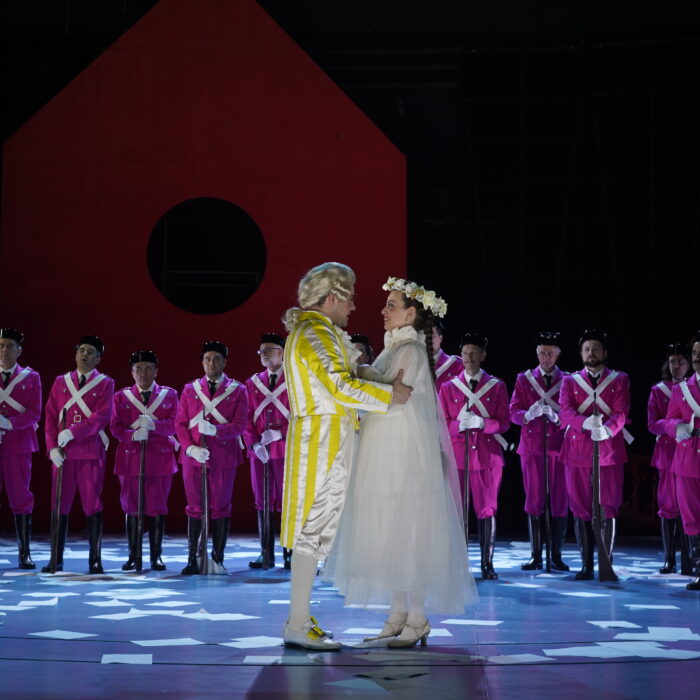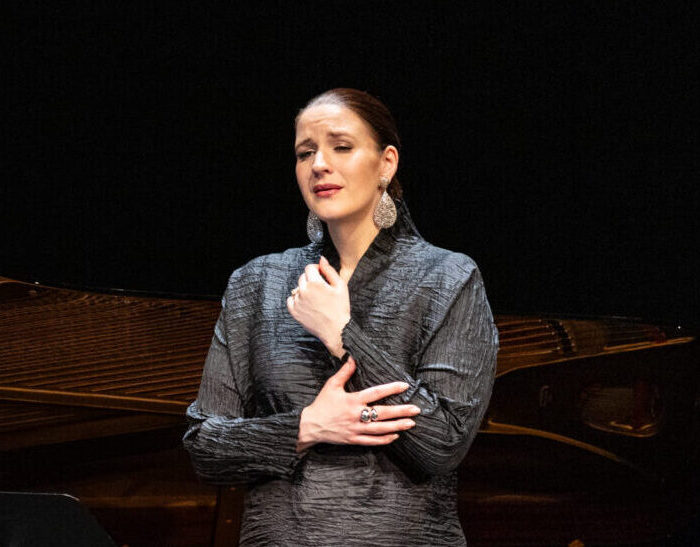
Royal Ballet and Opera 2024-25 Review: Festen
Mark-Anthony Turnage and Lee Hall’s adaptation of Vinterberg is magnificently executed
By Benjamin Poore(Photo: Marc Brenner)
Mark-Anthony Turnage is among the front rank of living British opera composers. With “Festen”, which opened at The Royal Opera last week, he now has five to his name, with a sixth to follow at Glyndebourne this autumn in the form of “The Railway Children” – a less harrowing subject than this adaptation of Thomas Vinterberg’s 1995 iconic statement of Dogme 95’s cinematic principles. His first was “Greek,” a version of Steven Berkoff’s rough-hewn Thatcherite reimagining of Sophocles, followed by “The Silver Tassie,” a haunting tale of a wounded World War One soldier. The gaudy “Anna Nicole” appeared at Covent Garden in 2011, with Eva-Maria Westbroek endowed with ever-inflating breasts perched on a sleazy jazz band score, with the whole house done up in hot pink. (It was a riot). “Coraline,” adapting Neil Gaiman’s surreal fairy tale, received a more muted reception in 2019.
A New Operatic Adaptation
“Festen” tells the story of a birthday party for the complacent hotelier Helge, drawing together his estranged, alcoholic son Christian, his nasty brother Michael, and daughter Helena. Their speeches reveal a history of abuse in the family the assembled guests simply will not hear, as the party gives rise to all manner of fights, pathologies, and desires. At the heart of the story is the exploration of another sister’s suicide, attributed to Helge’s abuse.
I had worried, unfairly, that this latest commission for Covent Garden might follow too closely the pattern of the most recent contemporary opera to grace the main stage, Kaija Saariaho’s “Innocence.” That piece, like “Festen,” takes place at a family gathering – a wedding – and sees the horrors of the past come to light (not, in that story, abuse, but the recollection of a brutal school shooting from years before). But where “Innocence” was elliptical in its handling of past trauma – violence seeping through the cracks – in “Festen” it is a deluge – blunt-force trauma, thanks to the incredibly direct and hard-edged libretto from Turnage’s collaborator Lee Hall, which is bracingly, brutally direct, as well as often very funny. (“Innocence,” for all its accomplishments, was not laugh-a-minute, whereas in “Festen” the magnitude of the horrors find their corollary in lots of moments of outrageous humor.)
This is not to suggest “Festen” is tactless in its approach to handling this kind of violence. On the contrary, the rough-and-tumble of the narrative – combined with son Christian’s unapologetic and fearless confrontation of Helge – makes it feel like the piece takes on abuse, very much on the side of the survivor. Against this is held the complicity and diffidence of the wider family, who either pretend it isn’t happening or, when the truth can’t be denied anymore, try to beat Christian into submission.
It’s a family and society that is deeply poisoned: Helena, sister of Christian, brings her Black boyfriend to the party (open-heartedly sung by Peter Braithwaite), only for him to be the subject of an appallingly racist rendition of “Baa Baa Black Sheep,” which erupts into a vicious, triumphant chorus, segueing in turn into a wild conga. These carnivalesque elements of the drama are properly appalling and riveting, rendered perfectly in Turnage’s music and a wonderful mise-en-scene from Richard Jones, who directed Turnage’s “Anna Nicole”.
In the less acerbic musical sequences, we hear shades of Benjamin Britten and Michael Tippett, with a wounded lyricism that Turange excels in, though the more easygoing tonal language he has adopted in the piece – certainly compared to the brittle intensity of “Greek,” or “Three Screaming Popes” – feels like it lets the audience off a little too easily. The brutality of the subject matter calls, perhaps, for equally vicious music. The very ending of the opera, in which the assembled guests exchange bland “good mornings” in the hotel lobby as if nothing has changed, feels underpowered, and we don’t see or hear in musical terms how devastating this must be to Christian, his brother, and sister.
A Thought-Provoking Production
Richard Jones’ production, with sets by Miriam Buether and costumes by Nicky Gillibrand, sees him at his cartoonish best, feeding the score’s garish fires. The hotel lobby and dining room, tasteless gold-marble reception desk, and cheap wood paneling – have the tacky glamour of a provincial hotel. It’s just the kind of place where a man as tiny as Helge would feel like a king. Between the scenes, nauseating wallpaper is projected onto the front cloth, the sofa where the abuse took place looming out of it. Jones’ lively direction means that a scene that cuts between three adjacent bedrooms grows in intensity: in one Christian and his former lover Pia have a sad, frosty reunion, whilst in the other drunken brother Michael rows with his wife before some frantic and abortive sex; it’s the kind of contrast that suits Jones’ style well, master as he is of awkward juxtaposition and ironic clashes of mood and tone.
This ability to disturb the audience’s mood with sudden eruptions of humor at moments of high seriousness is a powerful theatrical tool, as our feeling of sudden disbelief or bemusement identifies us with Christian, who is thrown into confusion at the bizarre reaction of the guests to his devastating revelations. Because we, as audiences, are used to sitting quietly, the silences in the piece – there are two shattering, hair-raising ones – trick us into complicity with the silence that greets Christian and Helena’s stories. It’s a thought-provoking piece of theatre, as well as being a bracing spectacle.
A Stellar Cast
The cast has twenty-five principal roles – making Thomas Adès’ party-based surrealist nightmare “The Exterminating Angel” look like a chamber opera by comparison, with its mere 16 – so singling out individuals for praise is to cast no aspersions by omission. Performances across the board are stellar, with nary a weak, and assembles the finest professionals from British opera and beyond, with all seasoned in the ways of bringing new work to life.
Chief among them is Allan Clayton, troubled soul par excellence, whose vocal power is undimmed and ability to sing a pianissimo on a big stage still unbeaten. Two vocal moments stick out, though there are countless more one could report. The first comes when he swoops across his entire range the line “He fucked his little children” – the shocking lyrical content is amplified by the sense that his entire vocal being is consumed with the effort of stating this terrible truth. Later, a floated line – “leave me alone” – has a terrifyingly quiet intensity and focus about the threshing of dissonant double basses. Stéphane Degout – who appeared in the premiere of Benjamin and Crimp’s “Lessons in Love and Violence” a few years ago – is in muscular, bombastic form as Christian’s brother, steely-toned and wholly inhabiting the seething rage that courses through the character; a special highlight is when he explodes, “how can I wear fucking BROWN SHOES to my father’s sixtieth birthday!?”
Gerald Finley was in oleaginous voice is as Helge, liquid, limpid, with an unearthly purity – it is as if his lyrical, avuncular turn as Hans Sachs has taken on an evil shine. His legato charisma is a perfect reflection of the ease with which he has perpetrated and denied these horrors. Natalya Romaniw as the daughter Helena is an oasis of tenderness and offers some lyrical reprieve, especially in the scene in which she reads out her sister’s suicide note, resisting any sentimental, fussy sob in the voice. Linda, the aforementioned sister, sings in only one scene, a sardonic setting of words by Julian of Norwich, and even if Turnage’s music is less compelling here, Marta Fontanals-Simmons is crystalline and haunting in her delivery.
Other smart turns include Philippa Boyle’s house debut as Michael’s wife Mette, whose crisp and exacting voice gives the husband as good as he gets in their emotionally taut scenes – no mean feat to stand out in such a crowd. Susan Bickley – yet more luxury casting as the Grandma – delivers a fragile, tender hymn-like line whilst the children beat each other around her, in a superb summation of operatic intent. John Tomlinson’s diction, as the dirty Grandpa, is as unmistakably clear as it ever has been, and his vice remains cavernous. How does he do it? Thomas Oliemans treads dignified ground as a naively lyrical MC from the evening, host the party from Hell, and is as well-drawn as everyone else onstage.
Huge credit should go to the production team for this meticulously detailed marshaling of such enormous forces in a fast-moving piece of theatre, where choreography, fighting, costume, and blocking are all pretty much seamless. Underneath all this roils away the Orchestra of the Royal Opera House, conducted by Edward Gardner in a relatively rare appearance at Covent Garden, though certainly one to be cherished. He has plenty of form championing British opera, opening his season at the London Philharmonic Orchestra with a barnstorming performance of Tippett’s “The Midsummer Marriage”; back in 2014, he premiered Julian Anderson’s family romance “Thebans” at the English National Opera. Under his direction, the orchestra snarls and struts, with the bluesy interludes riveting – especially the one that collapses in on itself at the climax of Act two. Solos – clarinet, saxophone, and cello – from the orchestra were as lyrically accomplished as the singing. Even if the opera isn’t faultless – what is? – it’s nonetheless a thrilling evening of theatre whose execution and craft are second-to-none.


